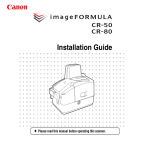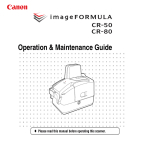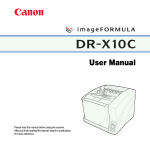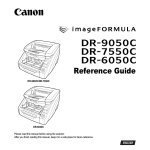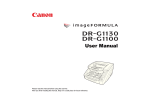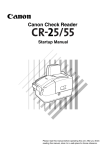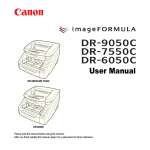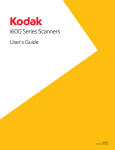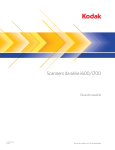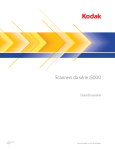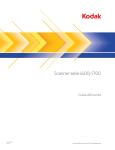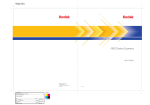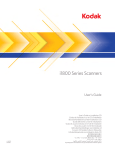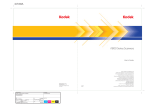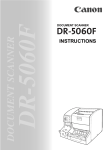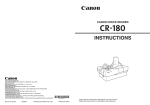Download Canon CR-50 Instruction Manual
Transcript
Instructions Please read this manual before operating this scanner. Connecting the Scanner to a Computer Connect the CR-50/80 to a computer as follows. Make sure to install the software before connecting the scanner to a computer. • If you connect the computer and turn ON the CR-50/80 before installing the software, the following wizard screen appears. If this happens, click [Cancel], turn OFF the CR-50/80, and then install the software. The following wizard screen is an example in Windows 7. When a similar wizard screen appears in Windows XP/Vista, click [Cancel]. Wizard Screen (Windows 7) 2 A Install the software B Connect the scanner to a computer C Turn ON the power D Automatically installing the device driver Install the Scanning Utility for CR-50/80 in the setup disc provided with the CR-50/80. (See “Installing the Software,” on p. 19.) Connect the CR-50/80 and the computer with a USB. (See “Connecting the Scanner to a Computer,” on p. 21.) Turn ON the power of the CR-50/80. (See “Turning ON the Power,” on p. 22.) The device driver is installed automatically when Windows recognizes the CR-50/80 as new hardware. (See p. 23.) READ CAREFULLY BEFORE OPENING THE SEALED DISK PACKAGE CANON SOFTWARE LICENSE AGREEMENT IMPORTANT-READ THIS AGREEMENT BEFORE OPENING THE SEALED DISK PACKAGE! BY OPENING THE SEALED DISK PACKAGE, YOU ARE DEEMED TO AGREE TO BE BOUND BY THIS AGREEMENT. This legal document is a license agreement between you and CANON ELECTRONICS INC. (“Canon”). BY OPENING THE SEALED DISK PACKAGE, YOU ARE DEEMED TO AGREE TO BE BOUND BY THE TERMS OF THIS AGREEMENT. IF YOU DO NOT AGREE TO THE TERMS OF THIS AGREEMENT, DO NOT OPEN THE SEALED DISK PACKAGE AND PROMPTLY RETURN THE CANON SCANNER, THE DISK PACKAGE CONTAINING SCANNER DRIVER SOFTWARE PROGRAMS AND/OR SCANNER UTILITY SOFTWARE PROGRAM PROPRIETARY TO CANON OR ITS LICENSOR (THE “SOFTWARE”) AND THE ACCOMPANYING DOCUMENTATION AND OTHER ITEMS TO THE PLACE WHERE YOU OBTAINED THEM FOR A REFUND BEFORE THEY ARE USED OR OPENED OR UNPACKED. In consideration of the right to use the SOFTWARE, you agree to abide by the terms and conditions of this Agreement. 1. GRANT OF LICENSE: Canon grants you the personal, nonexclusive right to use the SOFTWARE only on a single computer. You may physically transfer the SOFTWARE from one computer to another provided that the SOFTWARE is used on only one computer at any time. You shall not assign, sublicense, sell, rent, lease, loan, convey or transfer to any third party, or send or bring the SOFTWARE out of the country where you originally obtain it to other countries without required authorization of applicable governments, or copy, duplicate, translate or convert to another programming language the SOFTWARE or accompanying documentation, except as expressly provided herein. Except as expressly permitted under the applicable law, you shall not alter, modify, disassemble, decompile or otherwise reverse engineer the SOFTWARE or accompanying documentation and you also shall not have any third party do so. 2. BACK-UP COPY: You may make one copy of the SOFTWARE solely for a back-up purpose or copy the SOFTWARE onto the permanent storage device (e.g. a hard disk) of your computer and retain the original for a back-up purpose. Except as expressly permitted under the applicable law, any other copying of the SOFTWARE is a violation of this Agreement. You must reproduce and include the copyright notice on the back-up copy. 3. SUPPORT AND UPDATE: Canon, Canon’s affiliate, their distributor or dealer is not responsible for maintaining or helping you to use the SOFTWARE. No updates, fixes or support will be made available for the SOFTWARE. 4. LIMITED WARRANTY AND DISCLAIMER OF INDEMNITY: Canon, Canon’s affiliate, their distributor or dealer will not guarantee uninterrupted service, or absence or correction of errors. Therefore, the SOFTWARE is licensed on an “AS IS” basis without warranty of any kind. The diskette on which the SOFTWARE is recorded is warranted against defective material or workmanship under normal use for a period of ninety (90) days from the date you purchased the same as evidenced by a receipt or otherwise. The limited warranty does not apply if the failure of the diskette resulted from accident, abuse or misapplication of the SOFTWARE and shall not extend to anyone other than the original user of the SOFTWARE. CANON, CANON’S AFFILIATE, THEIR DISTRIBUTOR OR DEALER DISCLAIMS ALL IMPLIED WARRANTIES, INCLUDING ANY WARRANTY OF MERCHANTABILITY OR FITNESS FOR A PARTICULAR PURPOSE, WITH RESPECT TO THE SOFTWARE OR ACCOMPANYING DOCUMENTATION. NEITHER CANON, CANON’S AFFILIATE, THEIR DISTRIBUTOR NOR DEALER IS LIABLE FOR ANY LOSS OR DAMAGE INCLUDING CONSEQUENTIAL OR INCIDENTAL LOSS OR DAMAGE SUCH AS LOSS OF PROFITS, EXPENSE OR INCONVENIENCE, WHATSOEVER CAUSED BY OR ARISING OUT OF THE SOFTWARE, ACCOMPANYING DOCUMENTATION OR THE USE THEREOF. CANON, CANON’S AFFILIATE, THEIR DISTRIBUTOR OR DEALER SHALL HAVE NO OBLIGATION TO INDEMNIFY YOU AGAINST ANY CLAIM OR SUIT BROUGHT BY A THIRD PARTY ALLEGING THAT THE SOFTWARE, ACCOMPANYING DOCUMENTATION OR THE USE THEREOF INFRINGES ANY INTELLECTUAL PROPERTY OF SUCH THIRD PARTY. THE ABOVE IS CANON’S ENTIRE LIABILITY AND YOUR EXCLUSIVE REMEDY IN CONNECTION WITH THE SOFTWARE AND ACCOMPANYING DOCUMENTATION. 5. TERM: This Agreement is effective upon opening the sealed disk package and remains in effect until terminated. You may terminate this Agreement by destroying the SOFTWARE and any copy thereof. This Agreement will also terminate if you fail to comply with any of the terms of this Agreement. In addition to Canon enforcing its respective legal rights, you must then promptly destroy the SOFTWARE and any copy thereof. 6. U.S. GOVERNMENT RESTRICTED RIGHTS NOTICE: The SOFTWARE is provided with RESTRICTED RIGHTS. Use, duplication or disclosure is subject to restrictions as set forth in either subparagraph (c) (1) (ii) of the Rights in Technical Data and Computer Software clause at DFARs 252.227-7013 or subparagraph (c) (1) and (2) of the Commercial Computer Software Restricted Rights Clause at FAR 52.227-19, as applicable. 7. SEVERABILITY: In the event that provision of this Agreement is declared or found to be illegal by any court or tribunal of competent jurisdiction, such provision shall be null and void with respect to the jurisdiction of that court or tribunal and all the remaining provisions of this Agreement shall remain in full force and effect. 8. ACKNOWLEDGEMENT: BY OPENING THE SEALED DISK PACKAGE, YOU ACKNOWLEDGE THAT YOU HAVE READ THIS AGREEMENT, UNDERSTOOD IT, AND AGREE TO BE BOUND BY ITS TERMS AND CONDITIONS. YOU ALSO AGREE THAT THIS AGREEMENT IS THE COMPLETE AND EXCLUSIVE STATEMENT OF AGREEMENT BETWEEN YOU AND CANON CONCERNING THE SUBJECT MATTER HEREOF AND SUPERSEDES ALL PROPOSALS OR PRIOR AGREEMENTS, VERBAL OR WRITTEN, AND ANY OTHER COMMUNICATIONS BETWEEN YOU AND CANON RELATING TO THE SUBJECT MATTER HEREOF. NO AMENDMENT TO THIS AGREEMENT SHALL BE EFFECTIVE UNLESS SIGNED BY A DULY AUTHORIZED REPRESENTATIVE OF CANON. Should you have any questions concerning this Agreement, or if you desire to contact Canon for any reason, please write to Canon’s local affiliate. 3 FCC REGULATIONS (For 120V model) International ENERGY STAR® Office Equipment Program Check Reader, Model M111101/M111102 This device complies with Part 15 of the FCC Rules. Operation is subject to the following two conditions: (1) This device may not cause harmful interference, and (2) this device must accept any interference received, including interference that may cause undesired operation. Note: This equipment has been tested and found to comply with the limits for a Class B digital device, pursuant to Part 15 of the FCC Rules. These limits are designed to provide reasonable protection against harmful interference in a residential installation. This equipment generates, uses, and can radiate radio frequency energy and, if not installed and used in accordance with the instructions, may cause harmful interference to radio communications. However, there is no guarantee that interference will not occur in a particular installation. If this equipment does cause harmful interference to radio or television reception, which can be determined by turning the equipment off and on, the user is encouraged to try to correct the interference by one or more of the following measures: - Reorient or relocate the receiving antenna. - Increase the separation between the equipment and receiver. - Connect the equipment into an outlet on a circuit different from that to which the receiver is connected. - Consult the dealer or an experienced radio/TV technician for help. Use of shielded cable is required to comply with class B limits in Subpart B of Part 15 of FCC Rules. Do not make any changes or modifications to the equipment unless otherwise specified in the manual. If such changes or modifications should be made, you could be required to stop operation of the equipment. Canon U.S.A. Inc. One Canon Plaza, Lake Success NY 11042, U.S.A. Tel. No. (516)328-5000 As an ENERGY STAR® Partner, CANON ELECTRONICS INC. has determined that this machine meets the ENERGY STAR® Program guidelines for energy efficiency. The International ENERGY STAR® Office Equipment Program is an international program that promotes energy saving through the use of computers and other office equipment. The program backs the development and dissemination of products with functions that effectively reduce energy consumption. It is an open system in which business proprietors can participate voluntarily. The targeted products are office equipment, such as computers, monitors, printers, fax, machine, copiers, and scanners. The standards and logos are uniform among participating nations. RADIO INTERFERENCE REGULATIONS (For 120V models) This digital apparatus does not exceed the Class B limits for radio noise emissions from digital apparatus as set out in the interference-causing equipment standard entitled “Digital Apparatus”, ICES-003 of the Industry Canada. RÈGLEMENT SUR LE BROUILLAGE RADIOÉLECTRIQUE (For 120V models) Cet appareil numérique respecte les limites de bruits radioélectriques applicables aux appareils numériques de Classe B prescrites dans la norme sur le matériel brouilleur: “Appareils Numériques”, NMB-003 édictée par l’Industrie Canada. 4 Important Notice for ENERGY STAR Office Equipment Program. This model doesn’t provide “setting options” for power management. European Union (and EEA) only. This symbol indicates that this product is not to be disposed of with your household waste, according to the WEEE Directive (2002/96/EC) and your national law. This product should be handed over to a designated collection point, e.g., on an authorized one-for-one basis when you buy a new similar product or to an authorized collection site for recycling waste electrical and electronic equipment (EEE). Improper handling of this type of waste could have a possible negative impact on the environment and human health due to potentially hazardous substances that are generally associated with EEE. At the same time, your cooperation in the correct disposal of this product will contribute to the effective usage of natural resources. For more information about where you can drop off your waste equipment for recycling, please contact your local city office, waste authority, approved WEEE scheme or your household waste disposal service. For more information regarding return and recycling of WEEE products, please visit www.canon-europe.com/environment. (EEA: Norway, Iceland and Liechtenstein) Für EMVG Dieses Produkt ist zum Gebrauch im Wohnbereich, Geschäfts-und Gewerbebereich sowie in Kleinbetrieben vorgesehen. Model Names The following names may be provided for the safety regulations in each sales region of the Check Reader. CR-50: Model M111101 CR-80: Model M111102 Trademarks • Canon and the Canon logo are registered trademarks, of Canon Inc. in the United States and may also be trademarks or registered trademarks in other countries. • imageFORMULA is a trademark of CANON ELECTRONICS INC. • Microsoft, Windows, Windows XP, Windows Vista, and Windows 7 are registered trademarks or trademarks of Microsoft Corporation in the United States and other countries. • Microsoft product screen shot(s) reprinted with permission from Microsoft Corporation. • Adobe and Adobe Reader are registered trademarks or trademarks of Adobe Systems Incorporated in the United States and other countries. • Other product and company names herein are, or may be, the trademarks of their respective owners. Copyright Copyright 2011 by CANON ELECTRONICS INC. All rights reserved. No part of this publication may be reproduced or transmitted in any form or by any means, electronic or mechanical, including photocopying and recording, or by any information storage or retrieval system without the prior written permission of CANON ELECTRONICS INC. Disclaimers The information in this document is subject to change without notice. CANON ELECTRONICS INC. MAKES NO WARRANTY OF ANY KIND WITH REGARD TO THIS MATERIAL, EITHER EXPRESS OR IMPLIED, EXPECT AS PROVIDED HEREIN, INCLUDING WITHOUT LIMITATION, THEREOF, WARRANTIES AS TO MARKETABILITY, MERCHANTABILITY, FITNESS FOR A PARTICULAR PURPOSE OF USE OR NON-INFRINGEMENT. CANON ELECTRONICS INC. SHALL NOT BE LIABLE FOR ANY DIRECT, INCIDENTAL, OR CONSEQUENTIAL DAMAGES OF ANY NATURE, OR LOSSES OR EXPENSES RESULTING FROM THE USE OF THIS MATERIAL. CANON ELECTRONICS INC. IS NOT LIABLE FOR THE STORAGE AND HANDLING OF DOCUMENTS SCANNED WITH THIS PRODUCT, OR THE STORAGE AND HANDLING OF THE RESULTING SCANNED IMAGE DATA. IF YOU INTEND TO DISCARD THE ORIGINALS OF THE SCANNED DOCUMENTS, YOU ARE RESPONSIBLE FOR INSPECTING THE SCANNED IMAGES AND VERIFYING THAT THE DATA IS INTACT. THE MAXIMUM LIABILITY OF CANON ELECTRONICS INC. UNDER THIS WARRANTY IS LIMITED TO THE PURCHASE PRICE OF THE PRODUCT COVERED BY THE WARRANTY. 5 INTRODUCTION Thank you for purchasing the Canon Check Reader CR-50/80. Please read this manual thoroughly before using the machine in order to familiarize yourself with its capabilities, and to make the most of its many functions. Manuals for the CR-50/80 The following manuals are provided with the CR-50/80. Be sure to read these manuals thoroughly before using the scanner. (The Installation Guide and the Operation & Maintenance Guide are extracted from the Instructions.) Electronic manual is stored as a PDF file on the supplied Setup Disc and requires Adobe Reader to open. (You can download Adobe Reader from the Adobe Web site.) Installation Guide (Supplied with the scanner/Electronic Manual) Describes the procedure for setting up the CR-50/80 for scanning. Set up the CR-50/80 in accordance with the Installation Guide. For details on the CR-50/80, refer to the Instructions (electronic manual). Operation & Maintenance Guide (Supplied with the scanner/ Electronic Manual) Describes the basic operations for using the CR-50/80, troubleshooting, and maintenance. For details on the settings of the CR-50/80, refer to the Instructions (electronic manual). Instructions (Electronic Manual): This Manual Describes how to use the scanner, and includes instructions for configuring the scanner settings, as well as handling, maintenance, and troubleshooting information. 6 Symbols Used in This Manual The following symbols are used in this manual to explain procedures, restrictions, handling precautions, and instructions that should be observed for safety. WARNING Indicates a warning concerning operations that may lead to death or injury to persons if not performed correctly. To use the machine safely, always pay attention to these warnings. CAUTION Indicates a caution concerning operations that may lead to injury to persons, or damage to property if not performed correctly. To use the machine safely, always pay attention to these cautions. IMPORTANT Indicates operational requirements and restrictions. Be sure to read these items carefully to operate the machine correctly, and avoid damaging the machine. NOTE Indicates a clarification of an operation, or contains additional explanations for a procedure. Reading these notes is highly recommended. Table of Contents Connecting the Scanner to a Computer............................................... 2 INTRODUCTION ................................................................................. 6 Manuals for the CR-50/80 ........................................................ 6 Symbols Used in This Manual.................................................. 6 Important Safety Instructions ............................................................... 9 Handling ................................................................................... 9 Disposal ................................................................................. 10 Installation Location ............................................................... 10 Power Supply ......................................................................... 11 Moving the Scanner ............................................................... 11 Introduction to the CR-50/80.............................................................. 12 Features of the CR-50/80 ............................................................ 12 Features ................................................................................. 12 Packaging: What Is in the Box? ................................................... 13 Part Names .................................................................................. 14 Front View .............................................................................. 14 Rear View............................................................................... 16 Connectors/Power Switch ...................................................... 16 Exterior Dimensions ..................................................................... 16 Preparation Before Use ..................................................................... 17 Setting Up the Scanner ................................................................ 17 Checking Your Operating Environment ....................................... 18 Installing the Software.................................................................. 19 Installing the Scanning Utility ................................................. 19 Connecting the Scanner to a Computer....................................... 21 USB Connections ................................................................... 21 Connecting the Power Cord ................................................... 22 Turning ON and OFF the Power .................................................. 22 Turning ON the Power ........................................................... 22 Turning OFF the Power.......................................................... 23 Preparing the Ink Cartridge.......................................................... 24 About the Ink Cartridge .......................................................... 24 Setting the Ink Cartridge and Adjusting the Print Position ..... 24 Software............................................................................................. 28 How to Use the Software ............................................................. 28 How to Use the Scanning Utility............................................. 28 Uninstalling the Software ............................................................. 30 Document Feeding and Scanning...................................................... 33 Documents ................................................................................... 33 Document............................................................................... 33 Using Infrared Double Feed Detection................................... 34 Placing Documents ................................................................ 35 Document Feeding and Scanning................................................ 35 Scan Procedure ..................................................................... 36 Confirming Proper Document Feeding................................... 37 Troubleshooting ................................................................................. 40 When the Scanner Is Not Recognized ......................................... 40 Clearing Paper Jams ................................................................... 40 The Scanner Does Not Turn ON.................................................. 42 Feeding Trouble ........................................................................... 43 When the Scanned Image Is Not Normal .................................... 44 7 Maintenance ...................................................................................... 45 Daily Cleaning .............................................................................. 45 Cleaning the Main Unit ........................................................... 45 Cleaning the Inside of the Scanner ........................................ 45 Cleaning the Scanning Glass and Rollers.............................. 45 Cleaning the Magnetic Heads ................................................ 48 Cleaning the Ink Jet Nozzles.................................................. 49 Maintenance ................................................................................ 50 Replacing the Ink Cartridge.................................................... 50 Adjusting the Separation Roller Gap...................................... 52 Specifications ............................................................................... 55 Scanner Specifications........................................................... 55 AC Adapter Specifications ..................................................... 55 Index .................................................................................................. 56 8 Important Safety Instructions Handling WARNING ■ Never install and operate the scanner near flammable substances, such as alcohol, paint thinner, benzene, or any other type of volatile solution. ■ Never damage or modify the power cord, and never place heavy objects on the power cord. ■ Always make sure that your hands are dry when you are handling the power cord or power plug. Never grasp the power plug when your hands are wet. ■ Never plug the scanner into a multiplug power strip. ■ Never bundle, wrap, or tie the power cord around itself or another object. Connect the power plug securely into the power outlet. ■ Use only the power cord and power plug provided with the scanner. ■ Never attempt to disassemble or modify the scanner. ■ Never use flammable aerosol products near the scanner. ■ Before you clean the scanner, turn the power OFF and disconnect the power cord from the power outlet. ■ To clean the scanner’s exterior, use a firmly wrung cloth, moistened slightly with water or mild detergent. Never use any type of volatile solution, such as alcohol, benzene or paint thinner. ■ If you hear strange sounds, detect smoke or abnormal heat, sense vibration, or smell odd odors around the scanner, turn OFF the power switch immediately and disconnect the power cord from the power outlet. Contact your local authorized Canon dealer or service representative to have the scanner serviced. ■ Handle the scanner with care. Avoid shock and vibration to the scanner caused by reckless handling. If you suspect the scanner has been accidentally damaged, turn OFF the power switch immediately and disconnect the power cord from the power outlet. Contact your local authorized Canon dealer or service representative to have the scanner serviced. ■ Before you move the scanner, always turn OFF the power and disconnect the power cord from the power outlet. ■ This product emits low level magnetic flux. If you use a cardiac pacemaker and feel abnormalities, please be away from this product and consult your doctor. CAUTION ■ To avoid damage to the scanner, never place the scanner on an unstable or vibrating surface. The scanner may tip or fall over, causing injury. ■ Keep all liquids, beverages, or any type of liquid, and clips, staples, necklaces, or other metal objects away from the scanner. If you accidentally spill liquid or drop a metal object into the scanner, turn OFF the power immediately and disconnect the power cord from the power outlet. Contact your local authorized Canon dealer or service representative to have the scanner serviced. ■ Never install the scanner in humid or dusty locations. Doing so may cause a fire or electrical shock. ■ Never place heavy objects on top of the scanner, as these objects may tip or fall over, and cause injury. ■ When you remove the power cord, grip it by the power plug head. Never attempt to disconnect the power cord from the power outlet by pulling on the power cord. Doing so may damage or expose the cord’s internal wiring, and cause a fire or electrical shock. 9 ■ Keep the area around the power outlet clear of all obstacles so you can disconnect the power cord easily at all times. ■ Never spill water or volatile solutions (alcohol, benzene, paint thinner) into the scanner. Doing so may cause a fire or electrical shock. ■ When the scanner is not being used for a long period of time, disconnect the power cord from the power outlet. ■ Avoid wearing loose fitting clothing, dangling jewelry, long ties, or long hair that could become entangled with moving parts, especially the rollers that feed paper into the scanner. If such objects become entangled, immediately disconnect the power plug from the power outlet to stop the scanner. ■ Be careful when you are loading a document or clearing a paper jam. It is possible that the paper edges may cut your fingers. ■ Do not open the Maintenance Cover while the scanner is operating. Doing so may result in a malfunction or injury. ■ Do not touch the pins and contacts on the scanner’s connector with your hands. Doing so may result in a malfunction. Disposal When disposing of this scanner, be sure to follow all local ordinances and laws or consult with the retailer who sold you the scanner. 10 Installation Location For operation, maintenance, and ventilation, make sure that there is enough space around the scanner. Avoid placing the scanner in the following places. It may cause a malfunction and adversely affect the scanner or your computer. • Places exposed to direct sunlight If installation in such places is unavoidable, provide a curtain or similar object to shade the scanner. • Places subject to dust and fumes Dust and cigarette fumes adversely affect the components inside the scanner. • Near running water, a heat source, water vapor, or in an area, such as a laboratory exposed to ammonia gas, paint thinner, or other volatile chemicals • Places subject to excessive vibration and shock • Places subject to rapid changes in temperature or humidity Condensation occurring inside the scanner may impair image quality. Place the scanner in a room that is within the following range: Room temperature: 10°C to 32.5°C (50°F to 90.5°F) Relative humidity: 20% to 80% RH 20% to 50% RH when using the imprinter Use the recommended operating environment for the ink cartridge when using the imprinter. • Near electronic equipment or heavy equipment that generates a strong magnetic field, such as a speaker, TV, and radio Power Supply • Connect only to a power outlet of the rated voltage and power supply frequency (either 120V, 60 Hz or 220-240V, 50/60 Hz, depending on your region). • Make sure that the scanner is connected to an independent power outlet. Do not plug the scanner into an outlet shared with another device. If you use an extension cord, make sure that the extension cord is rated for the current requirements of the scanner. • If you are unsure of anything relating to the power supply, contact your local authorized Canon dealer or service representative for further information. • Never place an object on top of the power cord or step on the power cord. • Never bundle the power cord or wrap the cord around an object, such as a table leg. • Do not tug on the power cord. When you remove the power cord, grip it by the power plug head. • Keep the area around the power outlet free of obstacles. • Connect only to a power outlet of the rated voltage and power supply frequency (either 120V, 60 Hz or 220-240V, 50/60 Hz, depending on your region). • Do not connect to power outlets with other electrical devices. Also, when using an extension cord, make sure that the extension cord is rated for the current requirements of the scanner. • Disassembling and/or reassembling the AC adapter is extremely dangerous and should not be attempted under any circumstances. • Do not place heavy objects on the AC adapter or power cord. Do not place the adapter or cords in an area where they are likely to be stepped on. • Do not use the power cord while it is bundled. • Never pull directly on the power cord. To remove the plug from the outlet, grasp the plug directly and remove it from the outlet. • Keep the area around the power plug clear of articles so that the power plug can be disconnected in an emergency. • Use only the AC adapter provided with the product. Do not use the scanner’s AC adapter with any other product. • If you have any questions about the AC adapter, contact your local authorized Canon dealer or service representative for further information. Moving the Scanner When you move the CR-50/80, hold it firmly with both hands and carry it carefully. Do not hold the scanner by the Eject Stopper. The scanner weighs approximately 2 kg (4.4 lb). WARNING When moving the scanner, be sure to turn OFF the power and remove any cables. If the cables are not removed before moving the scanner, you may damage the plugs or connector by forcibly pulling them out. 11 Introduction to the CR-50/80 This chapter describes the features of the CR-50/80 scanner, what comes packaged in the box, and the names and functions of parts on the scanner. Features of the CR-50/80 Supports OCR (Optical Character Recognition) Character images, such as E13B, OCR-A, OCR-B, and check writer are recognized as characters by the OCR function. Easy to Maintain Maintenance Covers make handling paper jams and cleaning easy. The Canon Check Reader CR-50/80 is a scanner with magnetic heads that can read checks and other documents that are printed with MICR (Magnetic Ink Character Recognition) compatible fonts, and is capable of OCR (Optical Character Recognition). Paper Thickness Adjustment Mechanism Adjust the Separation Roller gap to the thickness of the paper being fed. Features Infrared Double Feed Detection (Scanning Utility for CR50/80) High-Speed Scanning The scanner detects double-fed documents using infrared sensor. The CR-50 performs high-speed scans of check-size documents at 50 cpm (200 dpi resolution). The CR-80 performs high-speed scans of check-size documents at 80 cpm (200 dpi resolution). Supports Large Documents Documents up to 108 mm x 228 mm (4.3" x 9.0") can be scanned. Compact Size 140 mm (W) x 223 mm (D) x 188 mm (H) (5.5" (W) x 8.8" (D) x 7.4" (H)) Supports Color, Black-and-White (Binary) and Grayscale Output Reads MICR Characters A magnetic head is used to scan MICR characters that have been printed with magnetic ink or toner. 12 Imprinter Is Standard Equipment An imprinter mechanism, which prints text on documents as they are scanned, comes standard equipped with the scanner. The imprinter’s ink cartridge is not included, and must be purchased separately. (See “About the Ink Cartridge,” on p. 24.) Packaging: What Is in the Box? Make sure that you have everything shown below. Check every item you have removed from the box. If any items are missing, contact your local authorized Canon dealer. Setup Disc Power Cord*1 CR-50/80 Marking Labels for Thickness Adjustment Dial AC Adapter Warranty Card*2 USB Cable User Registration Card*2 Installation Guide Operation & Maintenance Guide *1 The power cord varies, according to the country of purchase. *2 For the United States and Canada only. NOTE Items included in this package may change without any notice. 13 Part Names This section describes the names and functions of each part. Before you connect the CR-50/80, familiarize yourself with its parts and their functions. Front View Document Feed Opening Imprinter Cover Document Eject Opening Maintenance Cover Open this cover to clear paper jams or clean the scanner. Eject Stopper Adjust to match the length of the document. (See “Placing Documents,” on p. 35.) Document Feed Tray Pull out to load documents. (See “Placing Documents,” on p. 35.) 14 Paper Thickness Adjustment Dial Adjust the gap between the separation roller and feeding roller to the thickness of the paper being fed. (See “Adjusting the Separation Roller Gap,” on p. 52.) Power Indicator Lights blue when the power is turned ON. (See “Turning ON the Power,” on p. 22.) Ink Absorber Absorbs any ink that leaks out of the ink cartridge. Ink Cartridge The ink cartridge is not included, and must be purchased separately. (See “About the Ink Cartridge,” on p. 24.) Print Position Adjustment Lever Adjusts the print position. (See “Setting the Ink Cartridge and Adjusting the Print Position,” on p. 24.) Magnetic Head for MICR Reads MICR text printed in magnetic ink. (See “Cleaning the Magnetic Heads,” on p. 48.) Separation Roller Separates a stack of documents into single sheets one by one. (See “Adjusting the Separation Roller Gap,” on p. 52.) Feeding Roller Feeds the document. Lock Lever Locks the ink cartridge in place. 15 Rear View Exterior Dimensions Units: millimeters (units in parenthesis are inches) Reading Unit (Access Hatch) Open to clear paper jams or clean the scanner. (See “Clearing Paper Jams,” on p. 40.) 140 mm (5.5") Connectors/ Power Switch CAUTION To avoid overheating and causing a fire, never block the air vents on the back of the scanner. Power Switch Turns the scanner power ON or OFF. (See “Turning ON and OFF the Power,” on p. 22.) 16 Power Connector Connect the included AC adapter plug. (See “Connecting the Power Cord,” on p. 22.) USB Connector Connect a Hi-Speed USB 2.0 compliant USB cable. (See “USB Connections,” on p. 21.) 188 mm (7.4") Connectors/Power Switch 144 mm (5.7") 223 mm (8.8") Preparation Before Use This chapter describes how to prepare the scanner to scan documents. Setting Up the Scanner Perform the following steps to set up the CR-50/80. Refer to the section for each step for details about that step. A B Check your operating environment. (See “Checking Your Operating Environment,” on p. 18.) IMPORTANT • To have the device drivers installed automatically when the computer recognizes the CR-50/80, the software needs to be installed before the CR-50/80 is connected to the computer. • If you connect the computer and turn ON the CR-50/80 before installing the software, the following wizard screen appears. If this happens, click [Cancel], turn OFF the CR-50/80, and then install the software. The following wizard screen is an example in Windows 7. When a similar wizard screen appears in Windows XP/Vista, click [Cancel]. Install the software. (See “Installing the Software,” on p. 19.) Install the Scanning Utility provided with the CR-50/80. C D E Connect the scanner to a computer. (See “Connecting the Scanner to a Computer,” on p. 21.) Turn ON the power. (See “Turning ON the Power,” on p. 22.) Automatically installing the device driver. (See p. 23.) Wizard Screen (Windows 7) The device driver is installed automatically when Windows recognizes the CR-50/80. 17 Checking Your Operating Environment The following computer system requirements are recommended for using the CR-50/80. Operating Systems: • • • • Microsoft Windows XP (32bit) SP3 or later Microsoft Windows XP (64bit) SP2 or later Microsoft Windows Vista (32/64bit) SP1 or later Microsoft Windows 7 (32/64bit) Specifications: • CPU: Intel Core2 Duo 1.8 GHz or faster • Memory: 1 GB or more • USB 2.0 interface Interface Cable • Use the cable provided or a Hi-Speed USB 2.0 interface cable to connect to the computer’s USB port. Precautions for Use in 64-bit Operating Systems • The ISIS/TWAIN driver supplied with this product supports scanning with 32-bit applications only. • Even with 32-bit applications, not all ISIS/TWAIN compliant applications are guaranteed to operate. • Scanning speed may vary depending on the specifications of your computer. 18 IMPORTANT • If you use the USB interface that was provided as standard with your computer: • Use the most recently available USB 2.0 driver provided by Microsoft. Contact your local authorized Canon dealer for more detailed information. • Not all USB interfaces provided as standard with personal computers are guaranteed. Contact your local authorized Canon dealer for more detailed information. • Scanning speeds are slower if your computer’s standard USB interface is USB 1.1. • You should use the USB cable originally bundled with the scanner or a Hi-Speed USB 2.0 compatible cable. • If the CPU, memory, interface card, and other specifications do not satisfy the installation requirements, the scanning speed may be greatly reduced and transmission may take longer. • Even if the computer satisfies the recommended specifications, the scanning speed may vary, depending on the scan settings. Installing the Software The following software application is provided on the setup disc that is packaged with the scanner. Make sure to open and read the Readme.txt file on the setup disc before installing the software. Scanning Utility A Turn ON your computer, and log on to Windows. IMPORTANT Be sure to log on as the Administrator. B Insert the setup disc into the disk drive. C Click [Start], and then click [All Programs]. This manual assumes that “D” is assigned to your disk drive. Canon Scanning Utility is an application that provides scanning, file saving, image viewing, printing, and various other functions. A dedicated scanner driver is installed after you install the utility software. IMPORTANT • The Scanning Utility includes a device driver so that Windows can recognize the CR-50/80. Be sure to install the Scanning Utility before connecting the CR-50/80 to the computer. • Some functions mentioned in this manual may not be operated in some applications. The procedure in Windows XP is different from the ones described in this manual. Refer to the Windows XP “Help and Support Center” to select [Run]. Installing the Scanning Utility Follow the instructions below to install the Scanning Utility and the dedicated driver. NOTE The dedicated scanner driver is installed after the Scanning Utility has been installed. 19 D Click [Accessories], and then click [Run]. NOTE Installing the scanning utility will put the [Scanning Utility for CR-50&80] icon on your Windows Start menu. (See “How to Use the Scanning Utility,” on p. 28.) E Enter “D:\SU80\setup.exe” in the [Open] fields, and then click [OK]. Installation starts. F Follow the instructions on the screen to complete the installation. IMPORTANT The computer may need to be restarted, after the installation, depending on the operating system. If this is necessary, make sure to restart the computer. 20 Connecting the Scanner to a Computer The only way to connect the scanner to your computer is with a USB cable. USB Connections Connect the scanner and the computer with the cable provided or a Hi-Speed USB 2.0 cable. IMPORTANT • Be sure to use the USB cable bundled with the scanner or a Hi-Speed USB 2.0 compatible cable with the length less than 5 m. • When the application is running, do not turn the scanner OFF or unplug the interface cable. • Do not connect multiple CR-50/80 scanners to one computer. Type A Plug Type B Plug USB Connector CAUTION • Do not turn OFF the scanner or remove the interface cable when an application is running. • Turn OFF the computer and the scanner before changing the cable. NOTE Connect the type B plug (square) to the scanner and connect the type A plug (flat) to the USB port on the computer. 21 Connecting the Power Cord Connect the power cord. Make sure to use only the power cord provided with the scanner. WARNING When connecting the power cord, follow these precautions. Failure to do so may cause a fire or electrical shock. • Never grasp the power plug when your hands are wet. • Never plug the scanner into a multiplug power strip. • Never bundle or tie the power cord around itself or another object. Connect the power plug securely into the power outlet. • Use only the power cord and power plug provided with the scanner. • Before you connect the power cord, make sure to turn OFF the power switch. • Connect only to a power outlet of the rated voltage and power supply frequency (either 120V, 60 Hz or 220-240V, 50/60 Hz, depending on your region). • Do not plug the scanner into a power outlet shared with another device. If you use an extension cord, make sure that the extension cord is rated for the current requirements of the scanner. Turning ON and OFF the Power Follow the procedures below to turn the scanner power ON and OFF. Turning ON the Power A To turn ON the scanner, slide the Power Switch to the right. (ON) 22 IMPORTANT NOTE • When you turn ON the power, the power LED lights and remains lit. • If the scanner does not work, there is a problem with the scanner. Turn OFF the power, and contact your local authorized Canon dealer or service representative to have the scanner serviced. The CR-50/80 will be registered as “CANON CR-50 USB” or “CANON CR-80 USB” in the Imaging Device directory. WARNING If you hear strange sounds, detect smoke or abnormal heat, sense a vibration, or smell odd odors around the scanner, turn OFF the power immediately and disconnect the power cord from the power outlet. Contact your local authorized Canon dealer or service representative to have the scanner serviced. B Windows recognizes the CR-50/80 as new hardware, and installation starts automatically. Turning OFF the Power A B Turn OFF your computer. To turn OFF the scanner, slide the Power Switch to the left. (Windows 7) (OFF) CAUTION • Wait at least 10 seconds before turning the scanner back ON. • For your safety, disconnect the power plug from the power outlet if you are not using the scanner for a long period of time. 23 Preparing the Ink Cartridge A Hook your finger around the open lever and open the Maintenance Cover. This section describes how to prepare the ink cartridge so that you can use the imprinter to print text on scanned documents. About the Ink Cartridge The ink cartridge is not included with the scanner. Purchase an ink cartridge separately, as shown below. Manufacturer : Hewlett Packard Ink Cartridge Blue : C6602B (Canon#3693A002) Ink Cartridge Red : C6602R (Canon#3693A003) Ink Cartridge Green: C6602G (Canon#3693A004) Setting the Ink Cartridge and Adjusting the Print Position The ink cartridge needs to be set to print. Set the ink cartridge according to the following procedure. You can adjust the print position to three different levels. IMPORTANT • To set the ink cartridge, turn the scanner OFF before removing the Maintenance Cover. After the ink cartridge is set, replace the Maintenance Cover, and then turn the scanner back ON. • Finish up the unpacked ink cartridge as soon as possible. More frequent cleaning of the ink cartridge is required if long time elapses after unpacking. 24 B Remove the Imprinter Cover. C Remove the ink cartridge from its bag. IMPORTANT Do not touch the ink jet nozzle or contacts after peeling off the tag and tape. Tag Ink Jet Nozzle Contacts IMPORTANT Do not touch the ink cartridge contacts. This can cause a bad electrical contact and reduced print quality. D E Place the ink cartridge shown in the diagram below. Grasp the tag and then peel off the tape covering the ink jet nozzle. CAUTION Do not touch the electrical contact on the carriage. Doing so may cause a malfunction. 25 G NOTE Do not use more than one cartridge by rotation. If you do so, applications cannot check the ink level precisely. F Push down the ink cartridge until it clicks into place. Squeeze the Print Position Adjustment Lever and move it to adjust the print position. Top: 50.5 mm (1.99") from the bottom edge of the document Middle: 47 mm (1.85") from the bottom edge of the document Bottom: 43.5 mm (1.71") from the bottom edge of the document If the ink head drops back when installed, the two ink cartridge pins will not fit into the holes on the carriage. Push back the ink cartridge lock lever a in the direction of the arrow and reset the cartridge in the correct position b. IMPORTANT Make sure that the ink cartridge lock lever locks the ink cartridge into the correct position. Ink Cartridge Ink Cartridge Holes Pins If the cartridge does not load properly, see step 7. Ink Cartridge Lock Lever 26 H Carefully replace the Imprinter Cover. I Gently close the Maintenance Cover until it clicks into place. 27 Software This chapter describes how to use the Scanning Utility. B Click [Scanning Utility for CR-50&80]. C Start the Scanning Utility. How to Use the Software This section describes how to start up the Scanning Utility so that you can use the scanner. Read the Help files for the Scanning Utility for information on how to use it. How to Use the Scanning Utility This section describes the procedure for using the Scanning Utility. Read the [Help] file in [Scanning Utility] for more information. A 28 Click [Start], and then click [All Programs]. NOTE E Set the scan conditions and click [OK]. The basic operation of the Scanning Utility is noted in the Scanning Utility help file. On the [Help] menu, click [Help] to view the explanation. D Select [Scanner Setting] from the [File] menu. NOTE For information about the settings for the scan conditions, click [Help] on the Settings dialog box to open the Help file. F Select the scanning method from the [File] menu and start scanning. The Settings dialog box appears. 29 G When scanning is finished, click [Exit] on the [File] menu to quit the Scanning Utility. Uninstalling the Software This section describes how to uninstall the Scanning Utility. IMPORTANT Be sure to log on as the Administrator. A 30 Click [Start], and then click [Control Panel]. B Click [Programs], and then click [Programs and Features]. NOTE Depending on the status of your computer, the following screen may be displayed. In that case, double-click the [Programs and Features] icon. C Select the software that you want to remove from the list in the dialog box, and then click [Uninstall]. 31 NOTE When the [User Account Control] dialog box appears, click [Continue]. IMPORTANT If you uninstall the “Scanning Utility for CR-50/80” you also need to uninstall the “Canon Driver for CR-50/80.” D The [Confirm File Deletion] dialog box appears. If you selected “Canon Driver for CR-50/80,” the above dialog box appears. E Click [Yes], and the uninstaller starts. Follow the instructions on the screen to finish uninstalling the software. 32 Document Feeding and Scanning This chapter describes precautions regarding documents that can be handled on this scanner and scanning operations. Documents This section describes the types of documents that can be used and how to place them. CAUTION Treat the documents carefully. The paper edges may cut your fingers. Document The CR-50/80 can feed a wide variety of document sizes. The ranges of height and length for a document are: Height : 50 to 108 mm (2.0" to 4.3") Length : 80 to 228 mm (3.1" to 9.0") Thickness : 0.08 to 0.20 mm (0.003" to 0.008") 0.10 to 0.14 mm (0.004" to 0.006") with Double Feed Detection enabled Weight : 64 to 157 g/m2 (17 to 40 lb bond) 81 to 105 g/m2 (21.5 to 26.8 lb bond) with Double Feed Detection enabled Follow these guidelines when you prepare a document for scanning: • Before scanning documents that contain pasted artwork, make sure that the ink or paste is thoroughly dry. If the documents are scanned with wet ink or paste, the inside of the scanner may become dirty and it may cause a malfunction. • If you scan a document written in pencil, the letters may not be scanned properly or the pencil may rub off onto the rollers and stain subsequent documents. Before you scan this kind of document, make a copy, and then scan the copy. After scanning a document written in pencil or some other soft writing material, be sure to clean the scanning rollers. (See “Cleaning the Scanning Glass and Rollers,” on p. 45.) • If you scan thin paper in the Duplex mode, the ink printed on the back side may be scanned. If this happens, adjust the scanning density. • Scanning documents with a rough surface may not feed easily, and may cause friction between the documents, resulting in a feeding error. If this happens, feed the documents one by one. • To avoid paper jams, damage to documents, and a scanner malfunction, do not feed the following types of paper into the scanner. If you want to scan these types of paper, first make a copy, and then scan the copy. Length Height 33 Wrinkled or creased paper Carbon backed paper Curled paper Coated paper or fax recording paper Torn paper Extremely thin paper Paper with clips or staples Paper with binding holes NOTE • When Using the Accompanying Scanning Utility for CR-50/80: You can disable the double feed detection function from [Scanner Setting] in the Scanning Utility. • For more details about how to configure scanning parameters, click the [Help] button in the settings dialog box to view the Canon driver help. IMPORTANT NOTE • Note that mixing documents of different thickness may cause a malfunction during feeding. • Curled, wrinkled, or folded documents may cause an error. If this happens, straighten out the curls, or reduce the number of documents loaded. Using Infrared Double Feed Detection The double feed detection function that the scanner is equipped with uses the infrared sensor to detect when two or more documents are fed at the same time. If false detections happen too often, disable the double feed detection function. 34 • The following types of document may be misdetected as double fed: • Documents with a colored background • Documents with a glossy finish If misdetection of double feeds occurs often, turn off double feed detection. • Double feed detection is valid for documents with a thickness within the range 0.10 mm to 0.14 mm (0.004" to 0.006"). Double feeds cannot be detected for thicker or thinner documents. Placing Documents Note the following points when placing documents on the scanner. • Place the front of the document toward you. • A maximum of 50 documents or a document stack no higher than 5 mm (0.2") can be loaded at one time. • Move the stopper to the edge of the document in the document tray in accordance with the document. Otherwise, this may cause a paper eject error. • When scanning multiple documents, sort them into batches of uniform paper quality and thickness and load each batch separately. Note that loading mixed batches may cause paper jams. • When scanning relatively thick (0.15 mm to 0.2 mm (0.005" to 0.008") documents, the feeding process may cause the document to curl and cause paper jams at the document feed opening. For such documents, load no more than 10 sheets at one time. Document Feeding and Scanning This section describes how to load and scan documents. CAUTION • Avoid wearing loose fitting clothing, dangling jewelry, long ties, or long hair that could become entangled with moving parts, especially the rollers that feed paper through the scanner. If such objects become entangled, immediately disconnect the power plug from the power outlet. • Check the paper stack and remove all clips, staples, pins, or any other type of metal or plastic fastener. These objects may cause damage to the document, a paper jam, or a scanner malfunction. • Do not touch documents that are being fed under any circumstances. The documents that are being fed may cut your hand. IMPORTANT Align the documents and set the bottom of the documents level in the document tray. 35 Scan Procedure A B C Carefully align the edges of the document. Adjust the Eject Stopper in accordance with the document. E Instruct scanning to start from the software application. NOTE Load the documents with their front sides facing right and with their edges flush against the document load mark. Document Load Mark 36 D Pull out the document feed tray. • When Using the Accompanying Scanning Utility for CR-50/80: There are three scanning methods as follows. Follow the each instruction. Scan 1 page Click [Scan Page] from the [File] menu. Scan Batch to File A Click [Scan Batch to File] from the [File] menu. B Input the File name, and then click [Save]. C Select Simplex or Duplex, and then click [Start Scanning]. Scan Batch to Printer A Click [Scan Batch to Printer] from the [File] menu. B Select Simplex or Duplex, and then click [Start Scanning]. F Confirming Proper Document Feeding Scanning starts. NOTE When printing with the imprinter, ink may get on the leading edge of the document because the documents are ejected onto the printed surface. Depending on the thickness of documents scanned with the CR-50/80 and the paper thickness setting, double feeds or feeding errors may occur. After installing the CR-50/80 or before scanning documents of a different thickness, perform the procedure below to confirm that documents are separated one sheet at a time. If documents do not feed properly, see “Adjusting the Separation Roller Gap,” on p. 52 to adjust for paper thickness. A Ink residue Start the Scanning Utility. Printed text (back side) 37 NOTE C Load two documents with their edges flush against the mark. For instructions on using the scanning utility, see “How to Use the Scanning Utility,” on p. 28. You can also refer to the scanning utility help in the [Help] menu. Document Load Mark B Pull out the document feed tray. D E 38 Adjust the position of the eject stopper. (If necessary, see the diagram in step 4 on p. 36.) Click [Scan Page] from the [File] menu and confirm that only one sheet is fed. NOTE If the sheets do not feed properly (they double-feed or no sheets are fed), see “Adjusting the Separation Roller Gap,” on p. 52 to adjust for paper thickness. F Exit the scanning utility. 39 Troubleshooting This chapter describes the problems that might occur in the CR-50/80, and how to remedy them. When the Scanner Is Not Recognized Clearing Paper Jams If paper has jammed, open the Maintenance Cover and remove the jammed paper. The following causes and remedies describe why your computer may not recognize the scanner. Cause The Scanning Utility is not installed. Remedy Install the Scanning Utility before connecting the scanner to the computer. (See “Setting Up the Scanner,” on p. 17.) Cause The scanner is not correctly connected to the computer. Remedy Connect the scanner to the computer correctly. (See “Connecting the Scanner to a Computer,” on p. 21.) Cause The USB interface provided as standard with your computer is not compatible with the scanner. Remedy Not all USB interfaces provided as standard with personal computers are guaranteed. Contact your local authorized Canon dealer for more detailed information. (See “Checking Your Operating Environment,” on p. 18.) Cause USB cable is not compatible with the scanner. Remedy Use the USB cable provided with the scanner. (See “Checking Your Operating Environment,” on p. 18.) Cause USB hub is not compatible with the scanner. Remedy Remove the USB hub to use the scanner. (See “Checking Your Operating Environment,” on p. 18.) 40 IMPORTANT Do not attempt to pull the jammed paper upwards or backwards against the feeding direction. Doing so can damage the internal parts of the scanner. CAUTION • Be careful when you clear a paper jam. You may be injured unexpectedly. For example, the paper edges may cut your fingers, or the document may be damaged. • Remove all jammed sheets of paper. Paper scraps left inside the scanner may cause a paper jam or malfunction. A Hook your finger around the open lever and open the Maintenance Cover. B C If the paper is jammed at any other area: Pull the paper forward and clear the jam from the nearest opening. While lowering the down the OPEN lever, open the reading unit. Remove the paper that has jammed. D Gently close the reading unit until it clicks into place. If the paper is jammed at the pickup area: Pull the paper forward and clear the jam from the Maintenance Cover. 41 E Gently close the Maintenance Cover until it clicks into place. The Scanner Does Not Turn ON Check the following conditions, and take the appropriate action. The power switch is not in the ON position. Turn the switch into the ON position. (See “Turning ON the Power,” on p. 22.) The power cord is not connected into a power outlet. Connect the power cord into a power outlet. (See “Connecting the Power Cord,” on p. 22.) 42 Feeding Trouble If the document is not fed properly or the detection functions do not work properly, remedy the problem by checking the following conditions. Condition A paper jam has occurred. Cause and Remedy • Check to make sure that the size and thickness of the document are within the supported range of the scanner, and if the quality of the paper is appropriate. For cautions on handling documents, see “Documents,” on p. 33. • Documents with rough surfaces may cause a paper feed error to occur. • Dirty or worn rollers inside the scanner may cause a paper jam. Clean the rollers if they are dirty. (See “Cleaning the Scanning Glass and Rollers,” on p. 45.) Worn rollers must be replaced. Contact your local authorized Canon dealer or service representative to have the scanner serviced. • The Separation Roller gap is too wide. Adjust the Separation Roller gap. (See “Adjusting the Separation Roller Gap,” on p. 52.) Condition A double feed error often occurs. Cause and Remedy A double feed error may occur when documents with different thicknesses are mixed. If the above-mentioned method is not effective or you are using the CR-50/80 scanner, adjust the Separation Roller gap. (See “Adjusting the Separation Roller Gap,” on p. 52.) Condition MICR characters are not recognized correctly. Cause and Remedy • The scanner cannot correctly read MICR characters if the magnetic heads are dirty. Clean the MICR magnetic heads. (See “Cleaning the Magnetic Heads,” on p. 48.) • If MICR characters cannot be recognized correctly after cleaning the heads, the MICR heads may be worn. Contact your local authorized Canon dealer or service representative to have the scanner serviced. • The MICR text is on the back of the document. Load the side with the MICR characters face up in the document tray. Other Causes • Some of the MICR characters are scratched or missing. Splattered MICR ink or toner may also be the problem. Condition The imprinter is not printing correctly (missing imprint dots). Cause and Remedy Ink is clogged in the ink jet nozzle. Clean the ink jet nozzle. Cleaning the ink jet nozzle is recommended before using the CR-50/80. (See “Cleaning the Ink Jet Nozzles,” on p. 49.) Other Causes The ink cartridge may be empty. Condition Documents get dirty when using the imprinter. Cause and Remedy Ink from the imprinter has been placed on the feed path. Clean the ink off the feed path. (See “Cleaning the Ink Jet Nozzles,” on p. 49 and “Cleaning the Inside of the Scanner,” on p. 45.) 43 When the Scanned Image Is Not Normal If there is a problem with the scanned image (the image is not sharp or stripes appear), one of the following conditions may be a probable cause. Check the following conditions, and take the appropriate action. The scanning glass or rollers are dirty. If the scanning glass or rollers are dirty, the dirt will appear on the scanned image. Clean the scanning glass and rollers. For details, see “Cleaning the Scanning Glass and Rollers,” on p. 45. The scan conditions are inappropriate. If the scan conditions are inappropriate, the scanned image will not be sharp or will appear as dark. Check the brightness and other scanner settings. If the scanned image is blurry or the document has not been scanned at all, the brightness may be set too high. If the scanned image appears dark, the brightness may be set too low. Also, check the settings on the driver and the software application. The driver or application does not run correctly. If the document cannot be scanned correctly even if the scan conditions are adjusted, the driver or the application may not be functioning correctly. Reinstall the driver or application. For details on how to install the driver, see “Installing the Software,” on p. 19. For details on how to install the application, see the applications instruction manual. 44 Other Causes Even if the computer may be recognizing the scanner correctly, and the driver and the application is installed correctly, scanning may not be performed correctly. If this happens, the interface card is not compatible. Use the recommended interface card. If the above remedies do not rectify the problem, contact your local authorized Canon dealer or service representative to have the scanner serviced. Maintenance This chapter describes how to clean and maintain the scanner. Daily Cleaning To ensure high-quality image scanning, regularly clean your CR-50/80 as described below. CAUTION • Before you clean the scanner, turn OFF the scanner and computer, and disconnect the power cord from the power outlet. Otherwise, it may cause an electrical shock. • Never clean the scanner with any kind of organic solvent, such as alcohol, benzene, or paint thinner. This may cause a fire and electrical shock, or cause the exterior of the scanner to disfigure or discolor. • Never spray mild detergent or water directly on the scanning glass. The spray could penetrate below the glass and contaminate the internal light source and lenses. Cleaning the Inside of the Scanner Dust or paper particles inside the scanner can cause lines in scanned images. Use compressed air for regular cleaning of dust and paper particles from inside the scanner. After finishing a large scanning job, you should turn OFF the scanner and then clean off any paper particles that are remaining. Cleaning the Scanning Glass and Rollers If stripes appear on scanned images or if dirt appears on scanned documents, clean the scanning glass and rollers. Clean the scanning glass and rollers regularly. A Hook your finger around the open lever and open the Maintenance Cover. Cleaning the Main Unit Wipe the scanner with a firmly wrung cloth, moistened slightly with water or mild detergent. Then, wipe off with a clean, dry cloth. 45 B While lowering the open lever, open the reading unit. NOTE • Use cotton swabs to clean the rollers in locations that are too narrow for your fingers, such as a, b, j, n, o, and p. • Rollers in positions b, d, e, k, and p are turned by the roller in position e. Turn the roller in position e to wipe the rollers. • Rollers in positions m and n comprise two rollers each, an upper roller and a lower roller. • Do not force the rollers if they will not turn. In this case, wipe dirt only off of the exposed area. WARNING Do not use flammable liquids to clean the scanner, including alcohol, benzene, or paint thinner. C Ԣ Spin the rollers while wiping them clean with a firmly wrung cloth dampened with water or a mild detergent. There are 18 roller positions, as shown in the diagram below. ԣ Ԥ Ԧ ԧ ԥ Ԣ ԡ Ԡ ԙ Ԙ Ԛ ԛ ԟ Ԝ ԝ 46 ԧ Ԟ ԙ ԛ Ԝ D Use cotton swabs to clean the entire scanning glass. There are two scanning glass areas, one on each side. Use a cotton swab to wipe dirt from the entire surface of each. F Gently close the maintenance cover until it clicks into place. Scanning Glass IMPORTANT Scratches on the scanning glass may cause marks on the images and could cause feeding errors. If there are scratches on the scanning glass, contact your local authorized Canon dealer or service representative. E Gently close the reading unit until it clicks into place. 47 Cleaning the Magnetic Heads If the magnetic heads are dirty, then MICR characters cannot be scanned correctly. Periodically, clean the magnetic heads with a commercially available audio head cleaner. A B Hook your finger around the open lever and open the maintenance cover. Use a commercially available audio head cleaner to clean the magnetic heads. The magnetic head is located in the position shown in the diagram below. Magnetic Head 48 C Gently close the maintenance cover until it clicks into place. Cleaning the Ink Jet Nozzles Ink that collects around the ink jet nozzles may stain your documents or cause the text to appear as scratched. Clean the area around the ink jet nozzles periodically. Cleaning the ink jet nozzles is also efficient action when the printed text becomes faint. A B Hook your finger around the open lever and open the Maintenance Cover. IMPORTANT If your documents are stained and smudged from printing even after you clean the ink absorber, you should replace the ink absorber. Contact your local authorized Canon dealer or service representative. C Remove the ink cartridge. D Use a dry cotton swab to wipe off any ink on the ink jet nozzle. E Set the ink cartridge. For more information, see “Replacing the Ink Cartridge,” on p. 50. If the text still appear faint after this operation, replace the ink cartridge (See “Replacing the Ink Cartridge,” on p. 50.) Dampen a cloth with water, wring the cloth out thoroughly, and then wipe off the dirt around the ink absorber. Ink Absorber For more information, see “Setting the Ink Cartridge and Adjusting the Print Position,” on p. 24. 49 F Carefully replace the Imprinter Cover. Maintenance Make the following adjustments to maintain scanning quality. Replacing the Ink Cartridge The ink cartridge needs to be replaced if the printed text becomes scratchy or faint even if you have cleaned the ink jet nozzle. Replace the ink cartridge according to the following procedure below. IMPORTANT G Gently close the Maintenance Cover until it clicks into place. • To replace the ink cartridge, turn the scanner OFF before removing the Maintenance Cover. After the ink cartridge is set, replace the Maintenance Cover, and then turn the scanner back ON. • Finish up the unpacked ink cartridge as soon as possible. More frequent cleaning of the ink cartridge is required if long time elapses after unpacking. NOTE • Use an ink cartridge. (See “About the Ink Cartridge,” on p. 24.) • Do not use more than one cartridge by rotation. If you do so, applications cannot check the ink level precisely. 50 A B Hook your finger around the open lever and open the Maintenance Cover. Remove the Imprinter Cover. C D Squeeze in both sides of the print position adjustment lever and move the print cartridge carriage to its lowest position. Push back the ink cartridge lock lever in the direction of the arrow in the diagram below, and pull out the ink cartridge by grasping the tab as shown in the diagram. CAUTION Do not touch the ink jet nozzle right after imprinting. The nozzle may be very hot. 51 E Set the ink cartridge. Adjusting the Separation Roller Gap For more information, see “Setting the Ink Cartridge and Adjusting the Print Position,” on p. 24. If double feed should occur too often, adjust the Separation Roller gap according to the following procedure. F Carefully replace the Imprinter Cover. IMPORTANT • Make sure that the size, thickness, and weight of your document meets the conditions of this scanner. See “Document,” on p. 33. • Your unit has been carefully adjusted to meet most conditions. However, the below adjustment may be needed depending on your environment (humidity, temperature, etc.) and the documents you are scanning (checks, etc.). Perform the adjustment only if necessary. A G 52 Gently close the Maintenance Cover until it clicks into place. Hook your finger around the open lever and open the Maintenance Cover. B D Pull out the document feed tray. Slide the two sheets through between the feeding roller and the separation roller and stop at the position shown below. Two Sheets C Load two checks or check-stock paper together. NOTE Separation Roller Feeding Roller If you were unable to slide both sheets through the gap between the rollers, turn the paper thickness adjustment dial counter-clockwise (left) until both sheets two pieces easily slide through the gap. E Gently remove one of the sheets. Paper Thickness Adjustment Dial 53 F Adjust the gap between the feeding roller and the separation roller to optimum width. While one sheet remains in place between the rollers, continuously attempt to slide the second sheet (in front of the remaining sheet) to the right, back through the roller gap. Slowly turn the paper thickness adjustment dial clockwise (right) just until the second sheet stops feeding into the gap. I Place a marking label on the unit pointing to the adjustment dial as illustrated below. This will serve as a reference point for future adjustments if required. Second sheet does not feed into the gap. Marking labels for thickness adjustment dial IMPORTANT Turning the Adjustment Dial clockwise too much may damage the rollers. G H 54 Remove the sheets from the paper path and close the Maintenance Cover. Confirm that the document feeds properly. See “Confirming Proper Document Feeding,” on p. 37. If additional assistance is required, contact your local authorized Canon dealer or service representative. Specifications Scanner Specifications Interface Hi-Speed USB 2.0 Other functions Dimensions Infrared double feed detection 140 mm (W) x 223 mm (D) x 188 mm (H) (5.5" (W) x 8.8" (D) x 7.4" (H)) Weight Power requirement Approximately 2.0 kg (4.4 lb) DC16V 0.8A (excluding AC adapter) Power consumption Maximum Power: 20.4 W Sleep Mode: 4.7 W Power SW OFF: 0.5 W Less than 65 dB Type Desktop sheet-through scanner Document size Document feeding Height: 50 to 108 mm (2.0" to 4.3") Length: 80 to 228 mm (3.1" to 9.0") Thickness: 0.08 to 0.20 mm (0.003" to 0.008") 0.10 to 0.14 mm (0.004" to 0.006") with double feed detection enabled Weight: 64 to 157 g/m2 (17 to 40 lb bond) 81 to 105 g/m2 (21.5 to 26.8 lb bond) with Double Feed Detection enabled Automatic Scanning method Light source Contact image sensor (CMOS) LED Scanning side Scanning mode Simplex/Duplex Black-and-white, Fine Text Filtering, Error diffusion, 16-Level gray, 256-Level gray, 24-bit color Input AC 100-240V 50/60Hz 53VA-72VA Output Weight DC16V 1.4A Approximately 0.22 kg (0.49 lb) (excluding power cord) Scanning resolution (primary scan lines x secondary scan lines) Scanning speed Excluding 24-bit color: 100 x 100 dpi, 200 x 200 dpi, 300 x 300 dpi 24-bit color: 100 x 100 dpi, 200 x 100 dpi CR-50: 50 cpm (American checks) CR-80: 80 cpm (American checks) ■ Use the recommended operating environment for the ink cartridge when using the imprinter. ■ You can use the functions noted above if your software supports them. ■ These functions may not work depending on your computer’s capabilities and the software you are using. Automatic feeder capacity Load limit of less than 5 mm (0.2") (within the load limit mark) Automatic document feed Up to 50 sheets capacity Noise Operating environment Temperature: 10°C to 32.5°C (50°F to 90.5°F) Humidity: 20% to 80% RH (20% to 50% RH when using the imprinter) AC Adapter Specifications Specifications are subject to change without notice. 55 Index A H AC Adapter Specifications ............................................... 55 Adjusting the Print Position .............................................. 24 Amount loaded................................................................. 35 Handling .............................................................................9 I Imprinter Cover.................................................................14 Ink Absorber .....................................................................15 Ink Cartridge .........................................................15, 24, 50 Ink Jet Nozzle ...................................................................49 Installation Location..........................................................10 C Cleaning Main unit .................................................................... 45 Cleaning the Inside of the Scanner.................................. 45 Connectors/Power Switch................................................ 16 L D Lock Lever ........................................................................ 15 Daily Cleaning.................................................................. 45 Disposal ........................................................................... 10 Document Eject Opening ................................................. 14 Document Feed Opening................................................. 14 Document Feed Tray ....................................................... 14 Documents....................................................................... 33 Document .................................................................. 33 How to place documents ........................................... 35 Double Feed Detection .................................................... 34 E Magnetic head ..................................................................48 Magnetic Head for MICR ..................................................15 Maintenance .....................................................................50 Maintenance Cover ..........................................................14 Moving the Scanner..........................................................11 N Number of pages loaded ..................................................35 O Eject Stopper ................................................................... 14 Exterior Dimensions......................................................... 16 F Features of the CR-50/80 ................................................ 12 Feeding Roller.................................................................. 15 Feeding Trouble............................................................... 43 56 M Operating Environment.....................................................18 P U Paper Thickness Adjustment Dial .................................... 14 Power Connector ............................................................. 16 Power Cord ................................................................ 13, 22 Power Indicator ................................................................ 14 Power Supply................................................................... 11 Power Switch ................................................................... 16 Print Position Adjustment Lever................................. 15, 51 Unpacking the scanner.....................................................13 USB Connections .......................................................21, 40 USB Connector.................................................................16 R Reading Unit (Access Hatch)........................................... 16 Recognizing the scanner ................................................. 23 Rollers.............................................................................. 45 S Scanning Glass................................................................ 45 Scanning Utility .......................................................... 19, 28 Separation Roller ............................................................. 15 Setup Disc........................................................................ 13 Software How to Use the Software........................................... 28 Install ......................................................................... 19 Uninstall..................................................................... 30 Specifications................................................................... 55 T The Scanner Does Not Turn ON...................................... 42 Troubleshooting ............................................................... 40 Turning OFF the Power ................................................... 23 Turning ON the Power ..................................................... 22 57 CANON ELECTRONICS INC. 1248, SHIMOKAGEMORI, CHICHIBU-SHI, SAITAMA 369-1892, JAPAN CANON U.S.A. INC. ONE CANON PLAZA, LAKE SUCCESS, NY 11042, U.S.A. CANON CANADA INC. 6390 DIXIE ROAD, MISSISSAUGA, ONTARIO L5T 1P7, CANADA CANON EUROPA N.V. BOVENKERKERWEG 59-61, P.O.BOX 2262, 1180 EG AMSTELVEEN, THE NETHERLANDS CANON LATIN AMERICA, INC. 703 WATERFORD WAY, SUITE 400, MIAMI, FL 33126, U.S.A. CANON SINGAPORE PTE. LTD. 1 HARBOUR FRONT AVENUE #04-01, KEPPEL BAY TOWER, SINGAPORE 098632 CANON HONGKONG COMPANY LTD. 19TH FLOOR, THE METROPOLIS TOWER, 10 METROPOLIS DRIVE, HUNGHOM, KOWLOON, HONG KONG. PUB. CE-IE-836 © CANON ELECTRONICS INC. 2011


























































